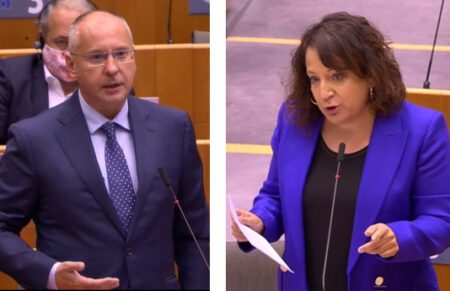Sergei Stanishev said:
“There is no time to waste. The Eurozone must offer an effective response and a clear political message that it is up to the challenge. This COVID-19 health crisis is damaging our prosperity and social welfare for years to come, we need aggressive and bold actions now. We must remember the lessons of the 2008 crisis – when citizens feel abandoned euroscepticism grows and undemocratic and populistic forces get stronger.
“As socialists and democrats, we have clear solutions to save lives and save jobs. All these measures must be taken now to prevent massive unemployment and companies going bankrupt.”
Iratxe García said:
“Never before has the world economy been put on hold, so this is unknown ground. What we know is that the more we prepare for the impact, the less painful it will be for the European Union to recover the positive growth path. The confinement needed to save lives is damaging our factories, businesses and workers, particularly the self-employed. People need to have a job to return to, many are in need of an urgent source of income to survive.
“This unprecedented shock demands a Marshal Plan-like Recovery Plan. Sadly, we have to remind some EU governments that solidarity between member states is not an option but an obligation under the treaty. However, beyond the law, European citizens will judge whether the EU was able to unite to protect them. Whatever the instruments chosen to tackle this crisis, we need a strong European response where countries will not be penalised for taking care of their citizens. As important as mutualising debt, is mutualising solidarity.”
Together, the PES and the S&D Group call for:
- Issuing ‘Corona-bonds’ to finance the recovery, guaranteed by a purchase programme of the European Central Bank.
- Building on the SURE, the establishment of an Unemployment Reinsurance Benefit Scheme and a temporary European Employment Guarantee to address potentially massive unemployment depending on the speed of recovery.
- Activating the European Stability Mechanism (ESM) with a specific credit line to avoid interest rate spreads of national public bonds, with no additional macroeconomic conditionality.
- Introducing a temporary European minimum income scheme to protect workers and the self-employed in precarious forms of work and low-income families.
- A loan guarantee for first home owners to prevent a mortgage default, together with a specific scheme to protect tenants from eviction during the crisis.



